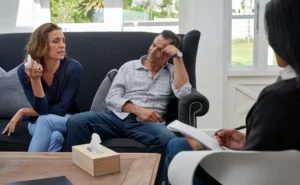The idea of polyamory, which entails having multiple love partners with everyone’s knowledge and permission, has acquired more attention and acceptability in recent years. However, it can be challenging to navigate the nuances of polyamorous relationships; this is where polyamorous relationship counseling comes in. This essay tries to inform you of all the information you require as well as a few little-known facts about it.
Contents
What Is Polyamorous Relationship Counseling?
 A type of therapy called polyamorous relationship counseling was developed specifically to help people and couples who are in polyamorous or non-monogamic relationships. Having numerous loving, consensual relationships going on at once with everyone involved’s knowledge and consent is referred to as polyamory.
A type of therapy called polyamorous relationship counseling was developed specifically to help people and couples who are in polyamorous or non-monogamic relationships. Having numerous loving, consensual relationships going on at once with everyone involved’s knowledge and consent is referred to as polyamory.
In polyamorous relationship counseling, the focus is on fostering open and effective communication, establishing and maintaining healthy boundaries, and addressing the emotional complexities that can arise in multiple-partner relationships. The counselor provides a safe and non-judgmental space where individuals and partners can explore their feelings, desires, and concerns related to their polyamorous lifestyle.
One of the primary goals of polyamorous relationship counseling is to enhance the understanding and acceptance of each partner’s needs and desires. This involves facilitating open dialogue about relationship agreements, expectations, and rules that are specific to each individual or partnership.
How Does Polyamorous Relationship Counseling Work?
 Polyamorous relationship counseling works by providing a supportive and non-judgmental space for individuals and couples to explore and address the unique challenges and dynamics of their polyamorous relationships.
Polyamorous relationship counseling works by providing a supportive and non-judgmental space for individuals and couples to explore and address the unique challenges and dynamics of their polyamorous relationships.
The process typically involves the following steps:
- Initial Assessment: The counseling begins with an initial assessment session where the counselor gathers information about the client’s relationship structure, history, and specific concerns. This helps establish a foundation for the counseling process and allows the counselor to understand the client’s needs and goals.
- Establishing Goals: Together with the clients, the counselor identifies and establishes clear goals for the counseling process. These goals may include improving communication, managing jealousy, setting and respecting boundaries, enhancing emotional intimacy, or addressing specific issues within the relationships.
- Emotional Support and Validation: Polyamorous relationships can bring about a range of emotions, including jealousy, insecurity, and feelings of exclusion. The counselor provides emotional support, validates these emotions, and helps clients navigate through them in a healthy and constructive manner. This may involve exploring the root causes of these emotions and developing strategies to address them.
- Boundary Setting and Negotiation: Establishing and respecting boundaries is crucial in polyamorous relationships. The counselor assists clients in identifying and communicating their personal boundaries and supports them in negotiating relationship agreements that work for all parties involved. This may include discussing topics such as time management, sexual health, and hierarchical structures.
- Education and Resources: The counselor offers education and resources specific to polyamory, including books, articles, and online communities. This helps clients gain a deeper understanding of polyamorous relationships, ethical non-monogamy, and strategies for maintaining healthy and fulfilling connections with multiple partners.
Polyamorous relationship counseling aims to empower individuals and couples to navigate the complexities of non-monogamy, build strong and healthy relationships, and find fulfillment within their chosen relationship structure.
How Is Polyamorous Relationship Counseling Beneficial?
 Polyamorous relationship counseling offers several benefits to individuals and couples practicing non-monogamy.
Polyamorous relationship counseling offers several benefits to individuals and couples practicing non-monogamy.
Some of the key advantages include:
- Improved Communication: Effective communication is crucial in polyamorous relationships, where multiple partners are involved. Counseling provides a safe and guided space for individuals to enhance their communication skills, express their needs, and listen actively to their partners.
- Conflict Resolution: Like any relationship, polyamorous relationships can experience conflicts and disagreements. Counseling equips individuals with conflict resolution tools and techniques specific to the dynamics of non-monogamous relationships.
- Building a Supportive Community: Polyamorous relationship counseling often provides individuals and couples with connections to a wider polyamorous community. This sense of community and belonging is valuable for individuals who may face societal stigma or lack support from their immediate social circles.
- Increased Self-Awareness: Polyamorous relationship counseling encourages self-reflection and self-awareness. Individuals and partners have the opportunity to explore their desires, values, and motivations within their polyamorous relationships. This introspection can lead to personal growth, increased self-acceptance, and a deeper understanding of their own needs and boundaries.
- Navigating Societal Stigma: Polyamorous relationships often face societal misunderstanding and stigma. Counseling can provide individuals and couples with strategies to navigate societal pressures and challenges in coming out to family and friends and managing external judgment.
- Sustainable and Fulfilling Relationships: Polyamorous relationship counseling aims to support the development of sustainable, fulfilling, and ethically non-monogamous relationships. By addressing communication, emotional well-being, boundaries, and conflict resolution, counseling helps individuals and couples build strong foundations for their relationships.
Polyamorous relationship counseling acknowledges the unique dynamics and challenges of non-monogamous relationships, providing individuals and couples with valuable tools, support, and guidance to navigate the complexities of their chosen relationship structure.
Finding The Right Polyamorous Relationship Counselor
 Finding the right polyamorous relationship counselor is an important step in receiving effective and supportive counseling.
Finding the right polyamorous relationship counselor is an important step in receiving effective and supportive counseling.
Here are some considerations to help you find a counselor who is well-suited for your needs:
- Seek a Counselor with Polyamory Knowledge: Look for a counselor who has experience and knowledge in working with polyamorous relationships. They should have a solid understanding of the unique dynamics, challenges, and opportunities that arise in non-monogamous relationships. A counselor who is familiar with polyamory will be better equipped to provide relevant guidance and support.
- Check Credentials and Specializations: Ensure that the counselor you consider is a licensed professional with appropriate credentials in counseling or therapy. Look for additional certifications or specializations related to relationship counseling, couples therapy, or non-monogamy.
- Research Experience and Approach: Look into the counselor’s professional background and experience working with polyamorous clients. Explore their approach to counseling and therapy. Some counselors may integrate specific methodologies or modalities that align with your needs and preferences. Read their profiles, websites, or online reviews to get a sense of their expertise and therapeutic style.
- Seek Recommendations: Reach out to the polyamorous community, online forums, or local support groups to ask for recommendations. Others who have sought counseling for their polyamorous relationships can provide insights into their experiences with different counselors or therapists.
- Interview Potential Counselors: Many counselors offer initial consultations or phone interviews to discuss your needs and their approach. Take advantage of these opportunities to ask questions, share your concerns, and gauge their understanding and compatibility. Consider asking about their experience with polyamory, their counseling style, and their views on ethical non-monogamy.
Remember that finding the right polyamorous relationship counselor may take some time and exploration. Don’t hesitate to consult multiple professionals and trust your judgment when assessing their fit with your unique needs and goals.
Things To Consider In Polyamorous Relationship Counseling
 While polyamorous relationship counseling can be beneficial, there are certain limitations to consider.
While polyamorous relationship counseling can be beneficial, there are certain limitations to consider.
These points include:
- Therapist Knowledge and Experience: It may be challenging to find counselors with specialized knowledge and experience in polyamory. As a result, there might be a limited pool of qualified professionals who fully understand the unique dynamics.
- Stigma and Cultural Bias: Polyamory is still not widely accepted or understood in society, and some therapists may hold personal biases or lack cultural competence regarding non-monogamous relationships. This can affect the quality of counseling and the level of support received.
- Accessibility and Availability: Finding polyamory-informed therapists in certain geographic areas or smaller communities may be difficult. Additionally, there may be financial constraints or limited insurance coverage for counseling services, making it less accessible for some individuals or couples.
- Individual Fit: Just like in any counseling or therapy, not every therapist will be the right fit for every individual or couple. It may take some trial and error to find a counselor who understands and supports your specific needs, values, and goals.
- Ethical Non-Monogamy Scope: Polyamorous relationship counseling may not address all aspects of an individual’s or couple’s non-monogamous lifestyle. The focus might be on interpersonal dynamics, communication, and emotional well-being. While other areas such as legal considerations or parenting arrangements may require additional specialized support.
Conclusion
Polyamorous relationship counseling provides a valuable resource for individuals and their partners seeking guidance. To navigate the complexities of non-monogamous dynamics. By addressing communication, emotions, boundaries, conflict resolution, and other essential aspects of polyamorous relationships. Counseling can foster healthier connections, personal growth, and greater relationship satisfaction. Embracing counseling as a proactive and supportive measure can lead to fulfilling and harmonious polyamorous relationships.
Relationships are complex, and it’s natural for issues to arise along the way. If you have any queries regarding Relationship Counseling experienced therapists at CoupleMantra can help: Book a trial couple therapy session.


